What is pvc layflat irrigation hose?
PVC layflat hose is a type of flexible hose made from PVC (polyvinyl chloride) material. It is designed for temporary water transfer or discharge applications. The hose is constructed with a flat design, allowing it to be easily rolled up and stored when not in use, hence the term “layflat.” PVC layflat hoses are commonly used in agricultural irrigation, construction dewatering, mining operations, and water pumping applications.
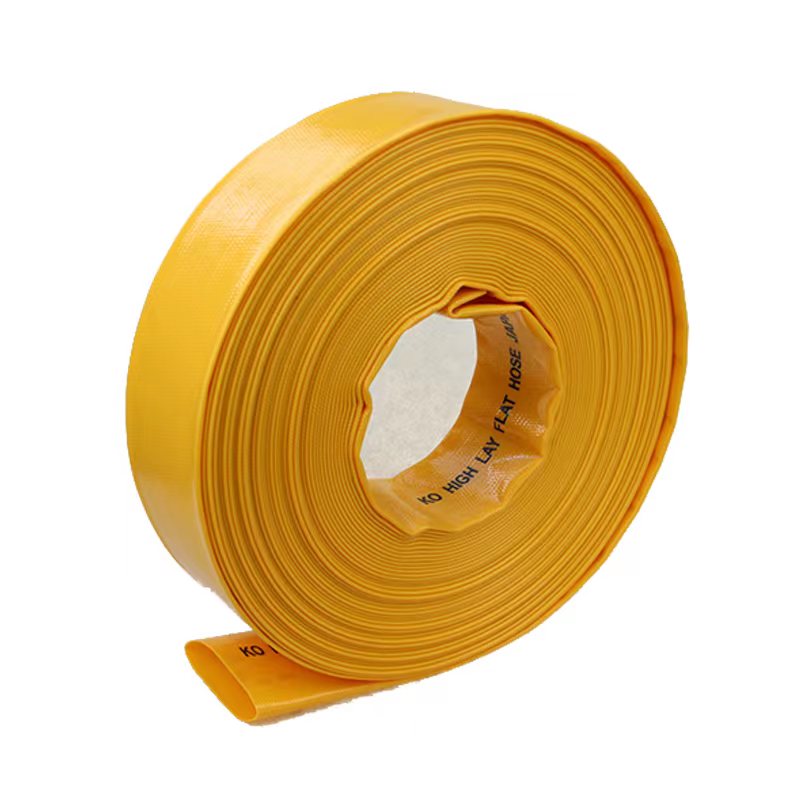
These hoses are lightweight, flexible, and easy to handle, making them convenient for various water transfer tasks. They typically come in rolls or coils, allowing for easy transportation and storage. PVC layflat hoses are available in a range of sizes, lengths, and pressure ratings to suit different application requirements.
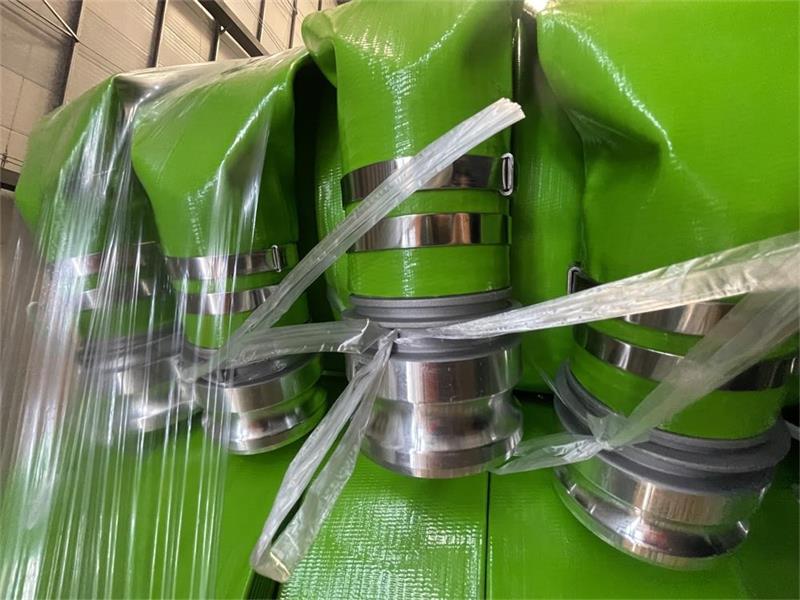
Features and Advantages of Agricultural Irrigation PVC Layflat Hose
- Flexibility: PVC layflat hoses are highly flexible, allowing for easy handling and installation in various irrigation systems.
- Flat Design: The hose’s flat profile enables convenient storage, transportation, and deployment, saving space and labor during setup and dismantling.
- Durability: Constructed from high-quality PVC materials, these hoses exhibit excellent resistance to abrasion, punctures, and weathering, ensuring long-term reliability in agricultural irrigation applications.
- Corrosion Resistance: PVC layflat hoses are resistant to corrosion from chemicals and fertilizers commonly used in agricultural operations, maintaining their structural integrity and performance over time.
- Lightweight: Compared to traditional rigid pipes, PVC layflat hoses are lightweight, facilitating easy handling and maneuverability during installation and relocation.
- Cost-Effectiveness: The affordability of PVC layflat hoses makes them a cost-effective choice for agricultural irrigation systems, offering excellent value for money without compromising on quality or performance.
- Versatility: These hoses are suitable for a wide range of agricultural irrigation applications, including crop irrigation, watering, and drainage, providing versatile solutions for different farming needs.
- High Flow Capacity: PVC layflat hoses feature smooth inner walls and large diameter sizes, allowing for efficient water flow with minimal friction loss, maximizing irrigation efficiency and coverage.
- Easy Maintenance: With simple cleaning and maintenance procedures, PVC layflat hoses require minimal upkeep, reducing downtime and operational disruptions in agricultural irrigation systems.
- Compatibility: PVC layflat hoses are compatible with various irrigation fittings, connectors, and accessories, offering seamless integration into existing irrigation setups and configurations.
Manufacturers and Suppliers of PVC LayFlat Hose
We are one of the manufacturers and suppliers of PVC layflat hose in Asia. PVC lay flat hose products are available in various sizes. Hose models include common 1 inch, 2 inch, 3 inch, and even 5,6 inches. Available or customized upon request.
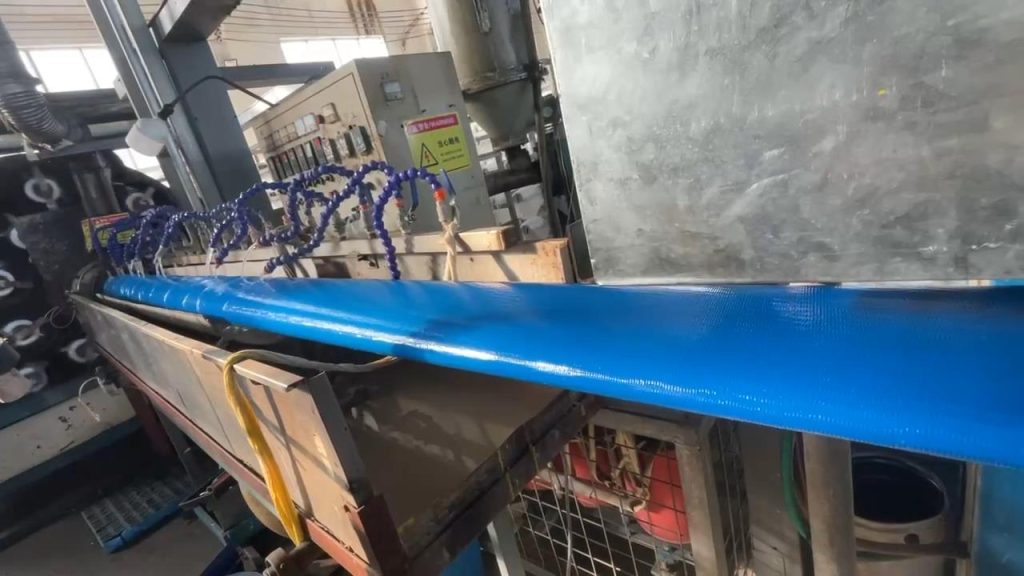
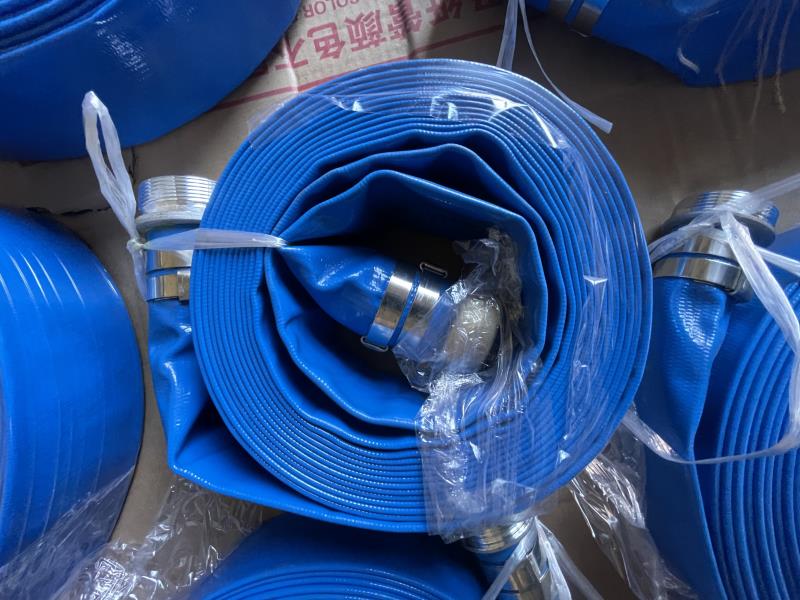
| Attribute | Value |
|---|---|
| Hose/Flexible Pipe | Lay-Flat Hose |
| Inner Diameter | ≥25mm |
| Material | PVC |
| Hose Operation | Transport |
| Maximum Working Pressure | 4-10 bar |
| Suitable for | Flat Rolling |
| Minimum Operating Temperature | -5°C |
| Maximum Operating Temperature | +60°C |
| Color | Blue, Red, Yellow |
| Length | ≤100m |
The lay flat hose is made from reinforced PVC (polyvinyl chloride) and synthetic fibers, which means it stays in TOP condition even under heavy use. The wear-resistant material also resists mildly abrasive chemicals, such as weed eaters and fertilizers. You can use this pipe for a variety of demanding applications such as water pumps, irrigation systems or drainage. Its sturdy design makes it a popular choice in the construction industry.
What are the uses of pvc flat hoses?
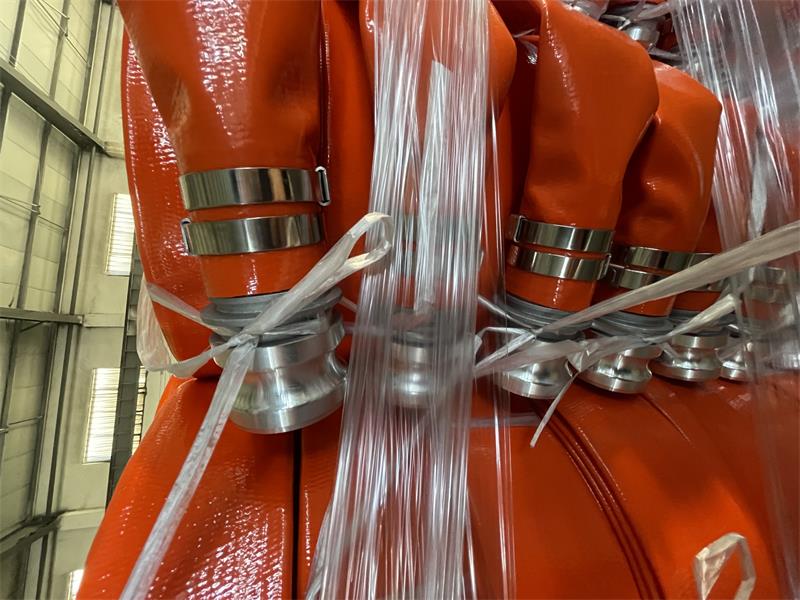
PVC flat hoses, also known as layflat hoses, discharge hoses, or sprinkler hoses, are versatile tools used for various applications. Here’s a breakdown of their common uses:
1. Agriculture:
- Irrigation: Their primary use is delivering water for irrigation in farms, orchards, and gardens. The flat design allows for easy coiling and storage when not in use.
- Transferring liquids: They can efficiently transfer water, fertilizers, and light chemicals within agricultural settings.
2. Construction:
- Dewatering: They are useful for dewatering trenches, basements, or flooded areas by pumping out excess water.
- Material transfer: They can be used to transport sand, gravel, and other loose materials for construction projects.
3. Industry:
- Liquid transfer: They are suitable for transferring liquids in industrial settings like factories and warehouses, such as coolants, lubricants, and light process chemicals.
- Dust control: They can be used for dust suppression during demolition or construction work by spraying water mist.
4. Mining:
- Dewatering: Similar to construction, they can help remove excess water from mines and quarries.
- Slurry transport: Some flat hoses can handle the transportation of low-abrasive slurries depending on their material and reinforcement.
5. Other Uses:
- Pool and spa maintenance: They can be used for filling or draining pools and spas, as well as transferring cleaning solutions.
- Firefighting: In some cases, they can be used for emergency water transfer during firefighting operations.
- Camping and recreation: Portable flat hoses are handy for transporting water for camping, RV use, or other outdoor activities.
Knowledge about PVC flexible hoses
PVC hoses have numerous practical applications, ranging from drainage to transporting drinking water. Generally, PVC pipes are sturdy and durable, but they can only withstand a weight of 28 pounds before they start to bend. Whether you’re using a load-deflection or self-deflection PVC hose, follow along as we explore how to calculate the maximum weight it can bear.
My first encounter with PVC hoses was when my friend made fake swords for live-action role-playing gear. Today, I know PVC hoses are the primary material for most piping projects and can be used to some extent for other projects too. PVC is a very robust material, but every material has its limitations. So, what’s the deal with PVC pipes?
The tensile strength of PVC hoses is significant, but their load-bearing capacity depends on the size and thickness of the pipe. Most PVC hoses cannot withstand more than 28 pounds of weight before they begin to bend. Some hoses may also start to bend under their own weight if they are too long.
A good rule of thumb is that you should never attempt to use PVC hoses to bear a significant amount of weight, especially if you don’t want them reinforced.
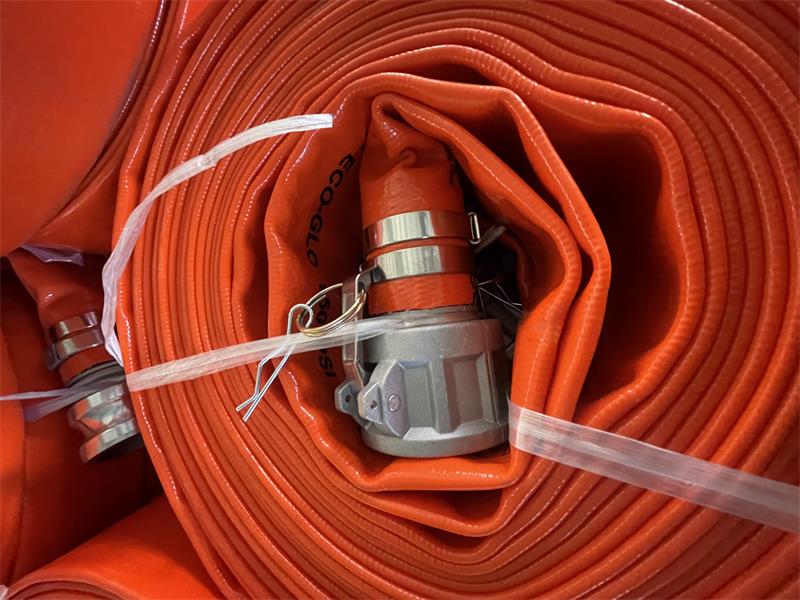
How to choose the right PVC flat hose?
- Size: Diameter determines water flow rate.
- Length: Matches the distance you need to transfer water or other materials.
- Material thickness: Impacts durability and pressure handling.
- Working pressure: Ensures the hose can withstand the water pressure of your application.
- Reinforcement: Reinforced hoses with polyester yarn offer increased strength for demanding tasks.
By understanding the uses and choosing the right specifications, PVC flat hoses can be a valuable tool for various watering, transfer, and dewatering needs.
What is price of the pvc lay-flat hose?
Our PVC flat lay hoses have different prices depending on the inner diameter and thickness. The price of our PVC flat hose is about US$0.4-3 per meter. In addition, market changes and material costs also directly affect the price. Please consult our professional service personnel to obtain the latest quotation.